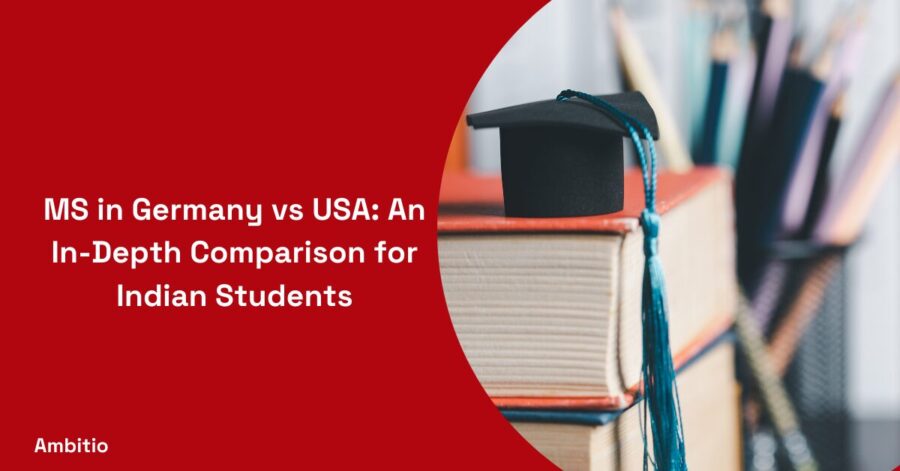11 December 2024
8 minutes read
MS in Germany vs USA: An In-Depth Comparison for Indian Students

The choice between the USA and Germany for postgraduate studies is a topic of hot debate, especially amongst Indian students. Both destinations possess unique benefits that can significantly shape a student’s future career and personal development. Let’s delve into a more detailed analysis of the benefits and challenges of studying in these two countries.
Studying MS in the USA: A Gateway to Global Opportunities
The United States of America, often dubbed as the “land of opportunities,” has been a preferred destination for international students, and Indians are no exception. US universities host a diverse international student population and are globally acknowledged for providing quality education and robust research opportunities.
Academic Excellence and Research Opportunities:
- Renowned US universities known for high academic standards and rigorous curriculum.
- Diverse course offerings across various fields.
- Heavy investment in research, offering students chances to contribute to their field.
- Enriched academic experience and strong foundation for future careers.
- Prestigious institutions like MIT, Stanford, Harvard, known for cutting-edge research.
Cultural Diversity:
- USA’s multicultural environment fosters interaction with diverse cultures.
- International students benefit from broader perspectives and enhanced cultural competence.
- Interaction promotes essential soft skill development.
Internship and Co-op Opportunities:
- USA provides strong internship and Co-op options, particularly in tech, finance, healthcare.
- Internships often integrated into curriculum for practical experience.
- Industry connections established, potential job offers through internships and Co-ops.
Cost of Studying and Living in the USA
Studying in the USA can be a costly affair. However, several avenues can help mitigate these costs.
Tuition Fees:
- US university tuition fees relatively high.
- Variations based on public/private, program level, field of study.
- Medicine, engineering, business courses often pricier.
- Scholarships and funding options available to offset costs.
Living Expenses:
- USA living costs vary by location.
- Major cities (NYC, SF, LA) expensive for accommodation, food.
- Midwestern, southern states (Texas, Florida) more affordable.
Scholarships and Financial Aid:
- US universities provide scholarships, grants, work-study for international students.
- Merit-based, need-based, sports-based scholarships available.
- Research/teaching assistantships offer tuition waivers, stipends for funding.
Visa Process and Stay in the USA
Understanding the visa process is crucial for international students aspiring to study in the US. The US government offers several types of visas to international students, among which the F-1 visa is the most common.
F-1 Student Visa
The F-1 visa is issued to international students who are enrolled in an academic program or in an English Language Program at a US college or university. The F-1 visa process involves multiple steps:
- I-20 Form: After being accepted into a SEVP (Student and Exchange Visitor Program) certified school, the student receives an I-20 form. This form is used to apply for the F-1 visa.
- Visa Application: The next step is to complete the DS-160 visa application form online and print the confirmation page for the interview.
- Visa Fees: The visa application process also requires the payment of the visa application fee (MRV fee) and the SEVIS (Student and Exchange Visitor Information System) fee.
- Visa Interview: After the fees have been paid and the DS-160 form completed, students need to schedule and prepare for a visa interview at the nearest US Embassy or Consulate.
Post-Graduation Stay in the USA – Optional Practical Training (OPT)
After completing their studies, students on an F-1 visa can apply for the Optional Practical Training (OPT) program which allows them to work in their field of study. The standard OPT period is 12 months, extendable up to 24 months for certain STEM fields. This means students can stay in the US for up to three years post-graduation.
Job Opportunities and Salary Expectations in the USA
The US job market is dynamic and offers numerous opportunities for graduates, especially in sectors like technology, healthcare, business, and finance.
Computer Science:
- Software Developer, Data Scientist, IT Manager roles.
- Median Salary: $85,000 – $120,000+.
- Key Industries: Technology, Finance, Healthcare.
Engineering:
- Mechanical Engineer, Civil Engineer, Project Manager positions.
- Median Salary: $80,000 – $110,000+.
- Key Industries: Manufacturing, Construction, Energy.
Business Management:
- Business Analyst, Marketing Manager, Operations Manager jobs.
- Median Salary: $70,000 – $100,000+.
- Key Industries: Finance, Consulting, Retail.
Healthcare:
- Healthcare Administrator, Medical Researcher, Nurse roles.
- Median Salary: $60,000 – $90,000+.
- Key Industries: Hospitals, Pharmaceuticals, Research.
Data Science:
- Data Analyst, Machine Learning Engineer, Statistician positions.
- Median Salary: $90,000 – $120,000+.
- Key Industries: Technology, Finance, Healthcare.
Finance:
- Financial Analyst, Investment Banker, Risk Manager jobs.
- Median Salary: $70,000 – $110,000+.
- Key Industries: Banking, Investments, Consulting.
Environmental Science:
- Environmental Consultant, Sustainability Manager roles.
- Median Salary: $60,000 – $90,000+.
- Key Industries: Energy, Conservation, Government.
Architecture:
- Architect, Urban Planner, Project Manager positions.
- Median Salary: $70,000 – $100,000+.
- Key Industries: Construction, Design, Real Estate.
MS in Germany: A Blend of Quality and Affordability
Germany has been recognized globally for its academic excellence and research-intensive courses. It is not only known for its automobile industry but also for its high-quality education system, especially in fields like engineering, natural sciences, and humanities.
Why Choose Germany?
- Quality of Education: German universities maintain high academic standards and are consistently ranked among the world’s best.
- Research Opportunities: Germany is home to numerous research institutions like the Max Planck Society and the Deutsche Forschungsgemeinschaft, allowing students to engage in groundbreaking research.
- Cost-Effective: Most public universities in Germany have low or no tuition fees for international students, making it an economically attractive destination.
- Cultural Experience: Studying in Germany also allows students to immerse themselves in European culture and history.
Top Universities in Germany
| Rank | University | Location | Notable Faculties | Research Emphasis |
|---|---|---|---|---|
| 1 | Ludwig Maximilian University of Munich (LMU) | Munich | Natural Sciences, Medicine | Broad Research Spectrum |
| 2 | Technical University of Munich (TUM) | Munich | Engineering, Computer Science | High-tech Innovations |
| 3 | Heidelberg University | Heidelberg | Life Sciences, Humanities | Interdisciplinary Research |
| 4 | Humboldt University of Berlin | Berlin | Social Sciences, Arts | Critical Thinking |
| 5 | Freie Universität Berlin | Berlin | Political Sciences, Law | Global Issues |
| 6 | University of Freiburg | Freiburg | Environmental Studies, Medicine | Sustainability |
| 7 | University of Tübingen | Tübingen | Cultural Studies, Medicine | Interdisciplinary Excellence |
| 8 | RWTH Aachen University | Aachen | Engineering, Applied Sciences | Industry Collaborations |
| 9 | University of Göttingen | Göttingen | Physics, Astronomy | Research Tradition |
| 10 | University of Mannheim | Mannheim | Business, Economics | Data Analytics |
Scholarships and Financial Aid in Germany
Germany offers a plethora of scholarships to attract international talent. Some notable scholarships include:
- DAAD (German Academic Exchange Service) Scholarships: Covers a wide range of subjects and is available to students of all nationalities.
- Einstein International Postdoctoral Fellowship: For postdoctoral research in Berlin.
- Heinrich Böll Scholarships: For students who are keen on working in the socio-political sectors.
Post-Study Work Opportunities in Germany
After graduating, international students have the chance to stay in Germany to seek employment. As mentioned earlier, Germany offers an 18-month stay-back option post-graduation. The Blue Card is another attractive proposition for students. It allows highly skilled non-EU citizens to work and live in Germany.
Challenges in Germany
While Germany has numerous advantages, there are challenges as well:
- Language Barrier: Though many Master’s courses are in English, daily life and certain job sectors might require proficiency in German.
- Cultural Adaptation: Understanding and adapting to German punctuality, directness, and other cultural nuances might be challenging initially.
Comparative Analysis: USA vs Germany
Making a decision between the USA and Germany for postgraduate studies requires analyzing various factors side by side:
| Aspect | USA | Germany |
|---|---|---|
| Tuition Fees | Generally higher, private institutions. | Mostly free in public universities, small contribution. |
| Cost of Living | Location-dependent, NYC expensive. | Generally lower, Munich pricier. |
| Post-Study Opportunities | OPT up to 3 years, especially STEM. | 18-month stay-back, EU Blue Card option. |
| Language | English courses. | English programs, German useful. |
Networking and Industry Ties
Networking plays a significant role in establishing a solid foundation for any professional’s career. The right connections can lead to research opportunities, internships, and job placements.
USA:
- Strong Alumni Networks: US universities like Harvard, Stanford, and MIT boast vast global alumni networks, which can be invaluable for job referrals and mentorship.
- Industry Integration: Courses in the USA often integrate industry professionals as part of their curriculum, offering students exposure to real-world challenges and solutions.
- Career Fairs: Regularly held on campuses, these attract top companies from around the world.
Germany:
- Industrial Partnerships: Given Germany’s strong engineering and manufacturing sectors, universities often collaborate with industries, providing students with practical experience.
- Research Collaborations: Institutions like Max Planck and Helmholtz Association offer students unique research opportunities.
- Job Seeker’s Visa: After studies, this visa allows students to stay and seek job opportunities, facilitating stronger ties with the German industry.
The Cultural Experience
Living and studying abroad is not just about academics; it’s also about experiencing a new culture.
USA:
- Melting Pot of Cultures: The USA is home to a diverse range of ethnicities, providing a unique cultural amalgamation.
- Campus Life: US universities emphasize extracurricular activities, fostering holistic student development.
Germany:
- Deep-rooted History: From its historic landmarks to its world-renowned Oktoberfest, Germany is a blend of old-world charm and modernity.
- Studentenwerk Services: Provides support to students in various aspects, including cultural integration.
Application and Admission Process
The admission process can be quite rigorous and varies from one country to another.
USA:
- Holistic Approach: Apart from test scores, US universities look at essays, extracurricular activities, and letters of recommendation.
- Standardized Tests: Most universities require GRE for MS and TOEFL/IELTS for English proficiency.
Germany:
- Course-specific Requirements: While many courses might require a GRE, some might prioritize your overall profile or specific coursework.
- Language Proficiency: Although many courses are in English, some might require proof of German proficiency (TestDaF or DSH).
Long-term Benefits
Looking at the long-term perspective, the decision to study in either country can be influenced by the potential of settling there.
USA:
- Challenging Immigration Policies: The H-1B visa, which allows graduates to work, is lottery-based, and not everyone might secure it.
- Global Hub: Despite challenges, the USA is home to Silicon Valley, Wall Street, and various other industry hubs, offering unparalleled opportunities.
Germany:
- Pathway to Permanent Residency: After studying and working for a few years, one can apply for permanent residency in Germany.
- EU Access: A German degree and work experience can pave the way for opportunities across the European Union.
Making The Right Choice
While both the USA and Germany have their set of advantages and challenges, the decision should be based on the student’s field of interest, financial capabilities, long-term goals, and adaptability. It’s essential to research thoroughly, perhaps reach out to alumni or current students, and make a well-informed decision.
Deciding between the USA and Germany for MS is not straightforward. It’s about aligning a country’s offerings with one’s personal and professional aspirations. Both countries provide top-notch education, but other factors like cost, work opportunities, cultural experiences, and long-term goals play a pivotal role in making a decision.
FAQ
Is education cheaper in Germany or the USA?
Generally, public universities in Germany offer tuition-free education, making it cheaper than the USA.
Is German language proficiency necessary for studying in Germany?
Many postgraduate courses in Germany are taught in English, but knowing German can be beneficial.
Are scholarships available in both countries?
Yes, both countries offer scholarships and financial aid to international students.
Can students work part-time while studying in Germany or the USA?
Yes, students are allowed to work part-time in both countries.
Which country offers better job prospects after MS?
Both countries offer robust job markets, though it depends on the specific field of study.
How is the research opportunity in Germany vs. USA?
Both countries provide excellent research opportunities.
Can I switch fields for my MS in both countries?
Yes, although it’s generally easier in the USA to switch fields.
Is living cost higher in Germany or the USA?
The USA generally has a higher cost of living than Germany.
What is the duration of MS courses in Germany and the USA?
In the USA, most MS courses range between 1.5 to 2 years, while in Germany, they typically last 2 years.
Can I get a permanent residency after studying in Germany or the USA?
Yes, both countries offer routes to permanent residency, but the process may be more straightforward in Germany.
Do I need to take the GRE for MS in Germany or the USA?
GRE is commonly required for US universities, while it’s less common but still sometimes required in Germany.
Is health insurance mandatory for students in both countries?
Yes, health insurance is mandatory for students in both Germany and the USA.
Can I stay back after completing my MS in both countries?
Yes, both countries offer stay-back options for students after completing their MS.
How can I fund my MS in the USA or Germany?
You can fund your education through personal funds, loans, scholarships, or part-time work.
What’s the student visa process for Germany and the USA?
Both countries require an application, fee, and an interview for a student visa.
Which country has a more rigorous application process for universities?
Both countries have rigorous processes, but specifics may vary by institution and program.
Are internships available for students in Germany and the USA?
Yes, both countries offer internship opportunities for students.
How diverse are universities in Germany and the USA?
Both countries host a diverse international student population.
What kind of accommodation options are available for students in Germany and the USA?
Both countries offer a range of accommodation options like university dorms, private rentals, shared apartments, etc.
Are there opportunities for cultural exposure in Germany and the USA?
Yes, both countries offer rich cultural experiences and exposure to a diverse international community.

You can study at top universities worldwide!
Get expert tips and tricks to get into top universities with a free expert session.
Book Your Free 30-Minute Session Now! Book a call now




























